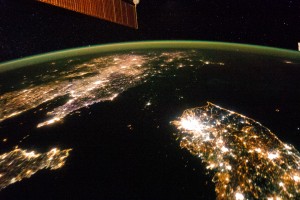According to Yonhap:
Trade volume between North Korea and its major trading partner China reached a record US$6.45 billion last year, up 10.4 percent from a year earlier, data showed Saturday.
North Korean exports to China jumped 17.2 percent on-year, while imports from China increased 5.4 percent, according to the data from the Korea International Trade Association.
Pyongyang’s trade deficit recorded $721 million, a 25 percent decrease compared with the previous year, the data showed.
North Korea’s major export items were minerals, with $1.37 billion worth of anthracite and $294.1 million of iron ore shipped to China last year.
North Korea’s anthracite exports are a major source of income, and China is virtually the only destination for the shipments.
The isolated socialist state heavily relied on China for crude oil, buying $598.1 million from its sole financial and diplomatic backer.
Inbound shipments of China-made cell phones fell to $44 million last year, shrinking by 26.6 percent from a year ago.
The latest data showed the heavily sanctioned North Korea is increasingly reliant on China, even though the Asian giant has become frustrated with its wayward neighbor, particularly after Pyongyang’s third nuclear test early last year.
Since these numbers are aggregated, we cannot observe if the purge of Jang song-thaek and his patronage network had any effect on DPRK/China trade at the end of the year.
The DPRK also increased oil imports from China in 2013. According to Yonhap (2014-2-10):
Shipments of crude oil to North Korea from China increased 11.2 percent on-year in 2013, a South Korean government report showed Monday, the latest sign that Beijing still gives Pyongyang access to the vital commodity despite its defiant pursuit of nuclear weapons.
North Korea imported a total of 578,000 tons of crude oil from China last year, compared with 520,000 tons in 2012, according to the report based on China’s customs data.
Monthly shipments of crude oil from China to North Korea were absent in February, June and July last year, but Beijing exported “a large amount of crude oil” to Pyongyang in the second-half of last year, the report said.
In 2013, trade between North Korea and China rose 8.9 percent on-year to reach US$6.54 billion, with the North’s exports to China jumping 18 percent to $2.91 billion, the report showed.
“Our overall analysis is that international sanctions against North Korea’s nuclear and missile programs have not reduced or shrunk the North’s trade with China,” a South Korean diplomat said on the condition of anonymity.
Here is coverage in the Daily NK.
Additional information:
1. Imports of grain were up. Food aid imports from UN were down.
Read the full stories here:
Trade between N. Korea, China hits record $6.45 bln in 2013
Yonhap
2014-1-31
N. Korea’s crude oil imports from China rise 11.2 pct in 2013
Yonhap
2014-2-10

